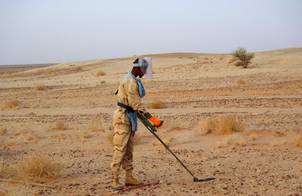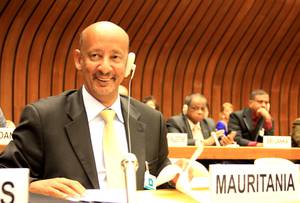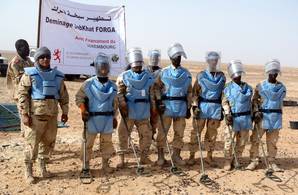|
29.11.2018
Download the press release | عربىPhotos of Mauritania at Convention meetingsPhotos of the 17MSPGeneva, Mauritania – Areas of Mauritania that were under the threat of anti-personnel mines for forty years are now deemed safe. “I am extremely honoured to declare that after four decades since these weapons were laid and nearly two decades of clearance, Mauritania is free of all known mined zones. This makes us the 31st State Party to the Anti-Personnel Mine Ban Convention to declare such feat,” said Mr. Alioune Ould Menane, Coordinator of Mauritania’s humanitarian mine clearance programme for development (pndhd). The statement came during the Seventeenth Meeting of the States Parties gathered in Geneva until 30 November where the Conference takes stock of challenges remaining to meet the ambition of a world free of anti-personnel mines by 2025. “Contamination is the residue of the 1976-1978 conflict in Western Sahara which was characterized by erratic laying of anti-personnel mines and a disproportionate number of these weapons used,” added Mr. Menane. “Mauritania became a State Party in 2000 and began the enormous task of clearing hazardous areas soon after. Due to difficulties encountered, Mauritania had to request additional time for clearance and our new deadline was set for 1 January 2021. We are glad we were able to finish our work before that date.”
Anti-personnel mines laid threatened, mutilated and killed civilians, were an impediment to development in the north and blocked basic socioeconomic activities such as grazing, fishing, tourism and commerce. “Landmine contamination and that from other explosive remnants of war were found in three regions of Mauritania in an area of approximately 68 square kilometres which were cleared and returned to the population and administrative authorities.
Convention President H.E. Suraya Dalil Ambassador of Afghanistan to Switzerland and UN in Geneva, congratulated Mauritania for achieving this important objective. “Mauritania should be proud for not giving up on its enterprise to become mine-free. Our ambition of a world free of these weapons by 2025 can only be achieved with increased and cooperative efforts like in Mauritania.” The Convention is the prime humanitarian and disarmament treaty aimed at ending the suffering caused by landmines by prohibiting their use, stockpiling, production and transfer, ensuring their destruction and assisting the victims of these weapons. It was adopted on 18 September 1997 and entered into force on 1 March 1999. Together, the 164 States Parties have destroyed more than 51 million landmines and 158 States Parties have fulfilled their stockpile destruction obligation. For more information, isu(at)apminebanconvention.org |






 The Mauritanian Government provided 68% of the overall cost of demining while the international community including France, Germany, Italy, Japan, Luxembourg, Norway, Spain, Sweden, Switzerland, the United States and various United Nations organisations including UNMAS, UNICEF and UNDP supported our efforts by contributing the remaining 38%.”
The Mauritanian Government provided 68% of the overall cost of demining while the international community including France, Germany, Italy, Japan, Luxembourg, Norway, Spain, Sweden, Switzerland, the United States and various United Nations organisations including UNMAS, UNICEF and UNDP supported our efforts by contributing the remaining 38%.”